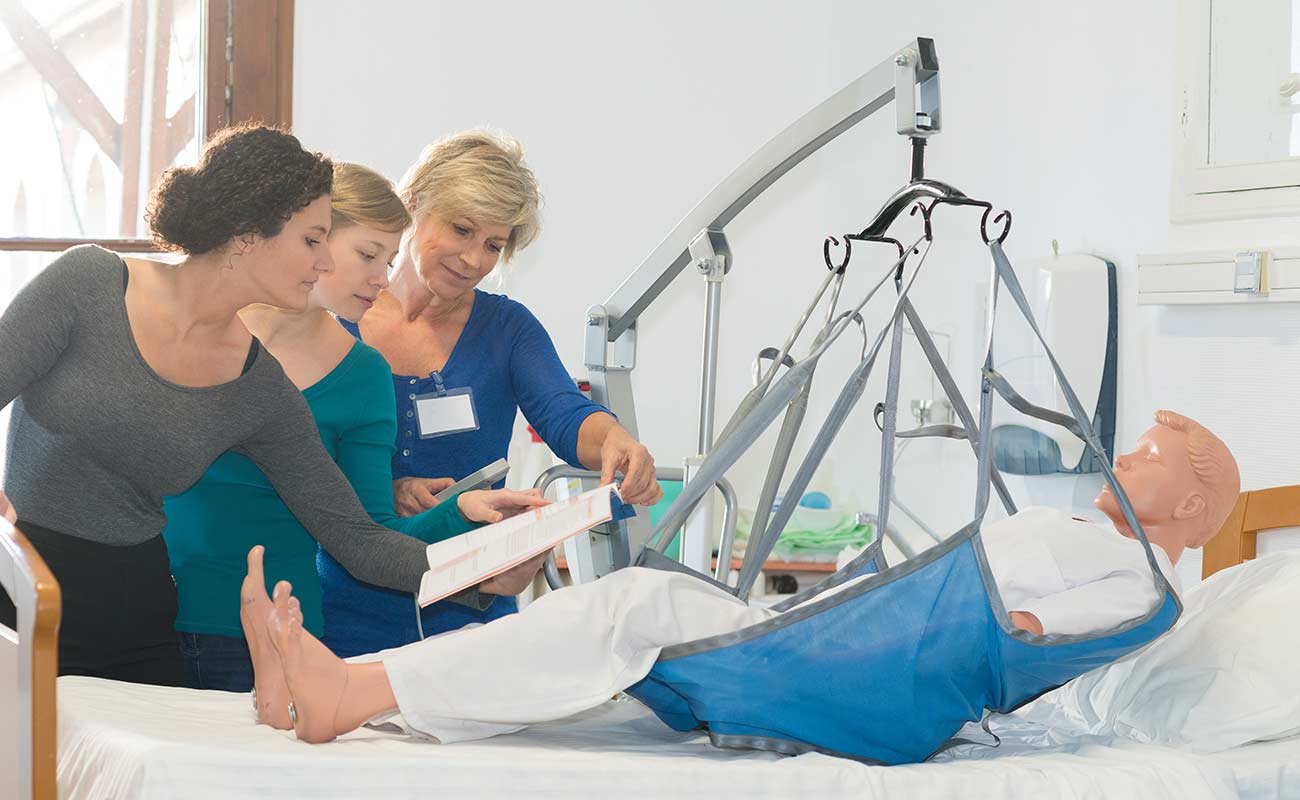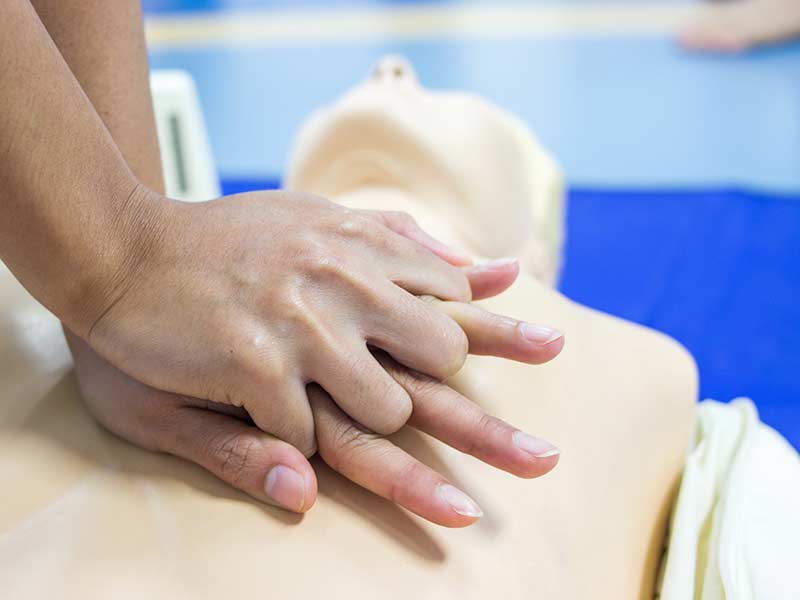TRAINING
Contact UsComplex Care Training
Continuous Professional Development is at the heart of ensuring person-centred care provision. The training programme starts as soon as our staff join us and runs through their time with us as part of their CPD.
All our staff attend initial mandatory training and then the specialist subjects for them to be able to provide safe care. Our clinical team provide the specialist courses which are offered inhouse at our training centre.
Details of some of the training we provide
Gastrostomy (PEG) care and enteral feeding
This is a theory and hands-on session to gain practical knowledge for safer and better care outcomes. It is ideal for nurses and carers working with complex care service users.
What is covered?
Theory:
- Anatomy and physiology of the enteral system
- Conditions that affect how the system works
- Types of gastrostomy tubes including NG/NJ/PEJ/JEJ
- The uses of gastrostomy tubes
- Daily care
- Complications and how to prevent them
- Types of feeding – bolus and continuous
Workshop:
Simulation (practical session) care and using feeding pumps.
Learners get a chance at simulated practice in how the gastrostomy tube is looked after, what to do to prevent complications and setting up different types of pumps.
At the end of this session:
The learners will have a good understanding of anatomy and physiology; gastrostomy care and enteral feeding; prevention of complications and will be able to practically demonstrate safe delivery of gastrostomy care and use of pumps.
Medication Administration Training
This is a comprehensive training session which looks at careful selection, preparation, and safe administration of medications. It is aimed at nurses and carers looking after complex care service users and ensures that they are aware of their responsibilities and accountabilities.
This course covers:
- Legislation around medication
- Classification of Medication
- Forms and types of medication
- Routes of administration
- Medication rights – Safety checks prior to administering medication – a systematic approach
- Checking the MAR chart
- Care planning – bespoke support in medication administration
- Errors – how to prevent and manage these.
- Documentation – signing for administered medication; recording refused medication; documenting expired medications and those not in use.
- Stock checking, ordering, and receiving medications
At the end of the training session, the learners will be aware of the legislation, their responsibilities, and accountability. They will have understanding in how to safely administer medications following the systematic approach. They will demonstrate safe delivery of bespoke support for the service users and will understand correct documentation.
Awareness & Buccal Midazolam Administration training
This training is designed for nurses and carers, to increase their awareness of the neurological condition in children and adults.
We look at:
- What the condition is and how it affects individuals.
- The causes of epilepsy
- Prevalence
- Types of Seizures and triggers
- The different treatments and protocols including medications and buccal midazolam administration.
- What to do when a seizure occurs
- What not to do
- Observation and care.
- Documentation
Following this training session, the learners will:
- Have a better understanding of epilepsy and
- Outline the causes
- Recall the different types of seizures and triggers
- Care for an individual with epilepsy
- Demonstrate understanding of protocols, care plan and documentation
Tracheostomy care
A tracheostomy is an artificial opening in the trachea and a tracheostomy tube is inserted to maintain an open airway and aid breathing.
This training session aims at providing knowledge and shared experiences to ensure the safety, care, and comfort of complex care service users.
We cover:
- Anatomy and physiology of the airway,
- Indications,
- Basic knowledge of tracheostomy and laryngectomy and their differences
- Types of tracheostomy tubes
- Emergency tracheostomy kit and safety checks – best practice.
- What to do if tube blocks, becomes displaced or falls out
- Emergency tracheostomy change and
- Routine tracheostomy change and changing inner tubes/cannula
- Tracheostomy care daily,
- Suctioning, nebulisers, changing tapes, speaking valves, mouth care
- Complications and how these are managed
Simulation practice:
- Stoma care
- Emergency (single-handed) tracheostomy tube change
- Routine tracheostomy tube change
-
At the end of the session, learners will:
- Demonstrate understanding of emergency situations requiring an emergency tracheostomy tube change
- Safely change a tracheostomy tube single handed and a tow people change
- Recall the complications that can occur
- Demonstrate the importance of clear documentation.
Ventilation Care
Ventilation training provides our nurses and carers with the necessary skills needed to care for children and adults requiring support with their breathing.
The session covers:
- Anatomy and physiology of the respiratory system,
- Oxygen therapy
- Oxygen delivery methods
- Dangers of using oxygen
- Indications for ventilation
- Invasive and non-invasive ventilation (NIV)
- BIPAP and CPAP
- Settings, care, and escalation plan
- safety checks,
- Benefits, complications and how to manage these.
- Complications
- Documentation
At the end of the training session, the learners will:
- Have a better understanding of ventilation and its benefits
- Demonstrate understanding of how to safely support and care for a child or adult requiring ventilation.
Spinal Care
A look at spinal injury and its effects on an individual’s life. The training session aims at empowering the nurses and carers to support the service users safely and effectively using best practice and following guidelines.
- Anatomy and physiology of the spine and its functions,
- How the condition affects an individual,
- Care and support of a service user requiring spinal care.
- Bowel care
- Care of urethral catheter, SPC care and intermittent catheterisation
- AD signs and other complications and management of these.
- Tissue viability
- Moving and handling
- Documentation
At the end of the session, the learners will:
- Demonstrate understanding in the care of an individual requiring spinal care.
- Be able to identify the possible complications and how to prevent and deal with them.
Mandatory Training
All our staff receive yearly mandatory training which is a legal and compulsory requirement. This ensures that they have the right knowledge and skills to carry out their duties safely and minimise risk to themselves and others.
Areas covered include:
- Infection Prevention & Control levels 1&2
- Information Governance
- Fire Safety
- Moving and Handling levels
- Resuscitation Adults levels
- Resuscitation Paediatrics levels
- Conflict Resolution
- Safeguarding Adults
- Safeguarding Children
At the end of the training, the learners will:
- Demonstrate awareness of the legal requirements of health and safety
- Have increased individual skills in areas of expertise.
- Have improved motivation to perform their job well.
A larger scope of training opportunities is also offered to our staff through our training partners and specialist hospitals to allow our staff to work with the varying conditions. Staff receive ongoing review of their competency through shadowing and supervision by checking their knowledge and skills. This ensures that we provide a bespoke service that is of the highest quality.


